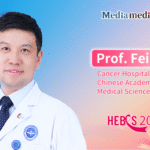
Editor’s Note: The Chinese Society of Clinical Oncology (CSCO) has witnessed and propelled the rapid growth of oncology in China. Countless Chinese experts have matured on this platform—evolving from newcomers to leaders, from learners to innovators. CSCO has become an indispensable cradle of academic development for many oncologists. At the 2025 CSCO Annual Meeting, Professor Man Li from the Second Affiliated Hospital of Dalian Medical University delivered a lecture on 'Basic Strategies for Endocrine Therapy in Early HR-Positive Breast Cancer.' In an interview with Oncology Frontier, she reflected on her personal journey of growth alongside CSCO and shared her insights into the future direction of endocrine therapy for HR+ early breast cancer.Q1. Growth with CSCO and Its Influence
Prof. Man Li: I started working in 1996 and became a member of the CSCO family in 1997. My membership number is 19970168—quite an early one. After entering the field of clinical oncology, I have grown together with CSCO. While witnessing CSCO’s rapid expansion, I have also developed professionally on this stage. I began as an ordinary CSCO member, later became a member and then a standing committee member of the Breast Cancer Expert Panel. I also grew from being a listener at academic meetings to becoming a speaker. I am deeply grateful to CSCO leaders, especially Professors Shukui Qin, Jin Li, and Zefei Jiang, whose guidance has shaped my career. These leaders have always been my role models—the goals I strive toward. As they have helped CSCO thrive, they have also inspired me and my team to continue advancing. In recent years, CSCO has fostered the creation of more and more original Chinese research results, which are now gaining international recognition. Passing on this spirit is crucial. I have learned so much during this journey—growing from a junior doctor to a seasoned oncologist. I believe CSCO has always upheld the philosophy of learning, improving, innovating, and elevating standards, which is precisely the direction I and my team continue to pursue. I hope CSCO will keep getting stronger, and that we can grow together with it and reach new heights.
Q2. Changes in CSCO Annual Meeting Over the Years
Prof. Man Li: Looking back over the years, CSCO has undergone significant transformation in multiple dimensions. In terms of academic content, CSCO has placed increasing emphasis on improving standardized diagnosis and treatment for cancer in China. In the past, the meetings mainly focused on explaining NCCN and ESMO guidelines. Today, with the release of more Chinese clinical research data, Chinese guidelines and expert consensus have gained increasing attention from both Chinese scholars and the public. Many drugs—particularly innovative therapies—are now available locally, providing more benefits to Chinese patients. From an organizational perspective, CSCO has continuously refined meeting structure and session design to better meet the needs of academic exchange and facilitate interactions between domestic and international experts. CSCO’s international influence has also grown remarkably. Whereas previous meetings were focused largely on the latest overseas clinical research, today we see foreign speakers actively participating in CSCO meetings and paying close attention to Chinese innovations. Meanwhile, Chinese experts have been shining on the global stage—especially at major international meetings such as ASCO—contributing an increasing number of original Chinese data. This year, the St. Gallen International Breast Cancer Conference even held a dedicated China session, allowing the world to hear China’s voice. This again demonstrates CSCO’s role in elevating Chinese oncology experts and helping generate milestone research results that shape clinical practice in China.
Q3. Future Direction of Endocrine Therapy for Early HR+ Breast Cancer
Prof. Man Li: The future of endocrine therapy for early HR-positive breast cancer will emphasize both precision treatment and comprehensive management. In terms of precision medicine, stratification is key. In this year’s CSCO breast cancer guidelines, prognostic recurrence risk for HR-positive, specific-genotype early breast cancer has been further subdivided into three categories—low, intermediate, and high risk. The purpose of such fine stratification is to enable precise drug selection, tailoring endocrine therapy strategies to the patient’s risk level. This represents a step forward toward precision medicine for early breast cancer. Comprehensive management now extends beyond treatment efficacy to include side-effect management. Multiple randomized controlled trials have demonstrated that enhanced adjuvant strategies—such as ovarian function suppression (OFS) in premenopausal women and extended endocrine therapy—are effective for patients at intermediate or high risk of recurrence. However, these strategies also underscore the need to manage adverse effects carefully. The key challenge in clinical practice is ensuring adherence: helping patients use high-quality medications consistently and over the long term to achieve true cure. This requires extensive communication with patients and thorough education to improve understanding of how the drugs work and why endocrine therapy is critical. Only then can these treatments be fully utilized for maximum benefit.
About the Expert

Prof. Man Li MD, Professor, Doctoral Supervisor Director of Oncology and Department Chair, Second Affiliated Hospital of Dalian Medical University Director, Phase I Clinical Trial Unit


